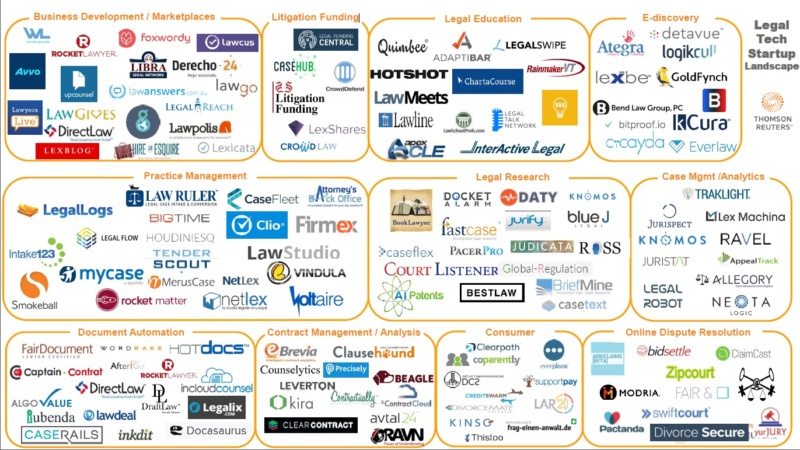Thomson Reuters Legal’s Director of Market Intelligence, David Curle, recently visited innovation hubs and legal tech conferences around Europe, including London, Berlin and Amsterdam. He shares his key insights about the people and companies already transforming our industry.
Law is doing its best to remain parochial …
The big problem with legal is that it’s very parochial and jurisdiction-specific. US lawyers don’t have a good sense of what’s going on in the UK, much less the rest of the world. You’d think that in the global, interconnected world in which we work, they would; but while it’s true that there are a number of truly global law firms, there’s a larger sense in which legal remains jurisdiction-specific. That’s partly the nature of law: every country has its own culture, systems and institutions.
… but technology is challenging its borders
What’s interesting is that technology is changing some of that, and breaking down those barriers. Some of the same drivers are pushing companies all over the world to focus on technology as a way to make legal services more efficient, better quality and more interconnected. We’ll continue to live in that jurisdictional world, but over the top of that, maybe this technology will mean that we have more in common across jurisdictions than was previously the case. There are centres of activity not just in London, Berlin and Amsterdam, but also Stockholm, Finland, Estonia, France and elsewhere in Europe.
Innovators across the world are running into the same problems
It’s fascinating the extent to which technologists with no legal background, or even some of the more forward-looking lawyers in each of these markets, are speaking the same language about their legal systems in different countries. Whether they are German, British, Swedish, Dutch, they all say the same things: that the traditional law firm is very conservative, bound to tradition, reluctant to take up technology and protective of its business model and the way things have always been done. It’s remarkable that they all say the same thing in all these different places.
Two categories are emerging: those who want to improve what we have …
When I look at the legal tech start-ups that are attacking this market, there are lots of different categories, but more generally there’s a mix of solutions that are targeted to lawyers, or to the existing legal services industry, to make it better or more efficient. That includes practice management systems, companies using AI in contract analysis, or data analytics to extract insights – these products are maintaining the existing industry and making it more efficient.

… and those who want to bypass traditional lawyers entirely
There’s also a huge undercurrent of work that is more targeted at the consumer legal market – what we might call the latent market. This is the legal work that doesn’t get done because people don’t have access to a lawyer, or it’s too expensive, or intimidating, working with legal systems that were set up to help lawyers and not people. That’s a large chunk and it’s a global phenomenon. A lot of those solutions are about bypassing traditional lawyers to help people underserved by the legal industry. These are solutions that allow people more directly to interface with courts, government, police and social services, to get things done without having to engage a lawyer. That includes self-help portals, ODR, making courts accessible to individuals.
Many of our systems were designed to serve lawyers, which is reflected in the language that was used – it’s understandable to a lawyer but makes no sense to anyone else. People don’t know who to call, what to do, or what it means: there are lots of barriers that are cultural and institutional, not technical, which need to fall.
Europe is an encouraging investment environment for entrepreneurs
I was encouraged by a comment from Balderton Capital’s Suranga Chandratillake, who said that “the law looks like a big pile of money that hasn’t changed hands for a long time.” Technology will increase transparency in the industry, which represents an opportunity. He also suggests that Europe has turned into a more welcoming place for entrepreneurs. Silicon Valley has that culture, but has a narrow focus: they’re good at technology but less good at the barriers you face when forcing change in an industry like legal.
Incremental change can still be radical
I don’t think the impact of legal tech will be a big bang – it’ll slowly gain momentum. There are too many slow-moving institutions in this industry. But they are moving, so we need to think in terms of incremental change. That’s not to say in ten years we won’t have a radically different industry. AI, for example, is very hyped, and I do think it will have a big impact in parts of the legal industry. But it’s a gradual shift. Today we think of the legal industry consisting of a handful of large and very powerful institutions – courts, legislatures, big firms – whereas in the future I think the whole ecosystem of institutions will become much more diverse. There’ll be different types of providers with a different specialism, and the clients, especially on the commercial side, will have a lot more to choose from.
Legal tech can learn from FinTech
I attended a Fin(Legal)tech conference in Chicago recently, and it made me wonder what can legal tech learn from FinTech. For example,what’s the role of quantitative methods in the law? What was great about the FinTech event was that there were increasing numbers of actual practitioners speaking, rather than the usual professors, evangelists, start-ups, and so on. These were actual practitioners grasping the idea of what’s revolutionary about what they’re doing. Maybe we’ll see more of that, and soon the legal industry, like the financial services industry, can be transformed by applying new quantitative techniques.
Follow @TRLegalUKI and @LegalExecutives for the latest on legal technology.
